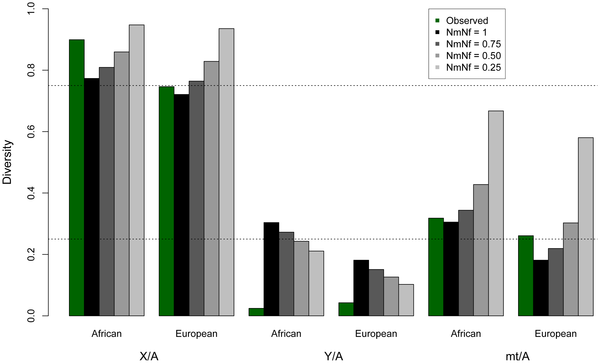Culturally, it's discussed that being a man in the Western world is going out of fashion. People are instead supposed to be homogenized into some sort of gender-neutral swirl of beliefs and actions, with only slight variation.
Even the Y chromosome is dwindling. Is it at risk of being lost?
The human Y chromosome contains 27 unique genes, compared to thousands on other chromosomes. Some mammals have already lost their Y chromosome, though they still have males, females and normal reproduction. This has led people to speculate that the Y chromosome is becoming superfluous. But the genes on the Y chromosome are important, they have been maintained by selection. They're probably not going anywhere.
As the X and Y chromosomes evolved, male-specific genes became fixed on the Y chromosome. Some of these genes were detrimental to females, so the X and Y chromosomes stopped swapping genes. This may have meant the Y chromosome was no longer able to correct mistakes efficiently and has thus degraded over time.

Observed and expected ratios of normalized X/Autosome, Y/Autosome, and mtDNA/Autosome nucleotide diversities. The expected values under an equal male/female ratio for X/Autosome ratio (0.75) and for Y/Autosome and mtDNA/Autosome (0.25) are plotted for reference. Twice the standard error is plotted for each model, computed from the ratios of 10,000 replicates per chromosome comparison. Expected values were computed from simulations using different demographic histories for Africans and Europeans (Tables 1, S4 and S5), first assuming equal numbers of males and females (Nm/Nf = 1), then successively skewing the effective number of males relative to females in each population (e.g. Nm/Nf = 0.75 implies three males for every four females in the population). All chromosomes were normalized for chromosome-specific mutation rates using divergence from chimpanzee. Credit and link: doi:10.1371/journal.pgen.1004064
There is low genetic diversity in the human Y chromosome, and Dr. Wilson Sayres and colleagues were able to precisely measure this by comparing variation on a person's Y chromosome with variation on that person's other 22 chromosomes, the X chromosome and the mitochondrial DNA.
The researchers then showed that this low genetic diversity cannot be explained solely by a reduction in the number of males passing on their Y chromosome (successfully fathering male offspring).
Instead, the low diversity must also result from natural selection, in this case purifying selection (the selective removal of deleterious alleles).






Comments